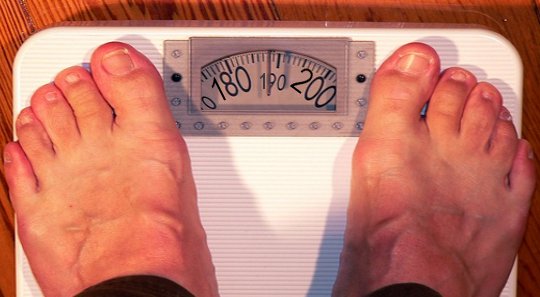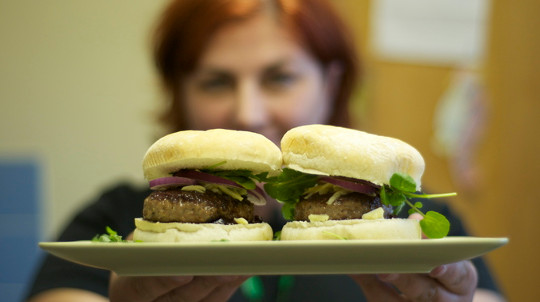- Clare Collins, Professor in Nutrition and Dietetics, University of Newcastle
- Read Time: 6 mins
 Don’t limit yourself to grapefruit – increasing the amount and variety of fruit and vegetables can help you lose weight. Monday – start diet. Tuesday – break diet! Wednesday – plan to start again next Monday.
Don’t limit yourself to grapefruit – increasing the amount and variety of fruit and vegetables can help you lose weight. Monday – start diet. Tuesday – break diet! Wednesday – plan to start again next Monday.


 Our brains are wired to pay more attention to things that have previously brought us pleasure—a bias that may explain why it’s so hard to break bad habits or stick to New Year’s resolutions.
Our brains are wired to pay more attention to things that have previously brought us pleasure—a bias that may explain why it’s so hard to break bad habits or stick to New Year’s resolutions. In the middle of the last century, popular nutrition author Adelle Davis advised people to eat breakfast like a king, lunch like a prince, and dinner like a pauper. Her advice stuck. Recent examination of the merits of adults eating breakfast has raised the question of whether we should indeed eat like kings at breakfast or just skip it all together.
In the middle of the last century, popular nutrition author Adelle Davis advised people to eat breakfast like a king, lunch like a prince, and dinner like a pauper. Her advice stuck. Recent examination of the merits of adults eating breakfast has raised the question of whether we should indeed eat like kings at breakfast or just skip it all together. Multiple sclerosis affects millions of people worldwide. It’s a neurological disease characterised by inflammatory lesions in the central nervous system (the brain and spinal cord) that cause damage to the myelin sheath – the protective layer around the nerve cells. This causes neurological dysfunction, such as muscle paralysis or loss of sensation.
Multiple sclerosis affects millions of people worldwide. It’s a neurological disease characterised by inflammatory lesions in the central nervous system (the brain and spinal cord) that cause damage to the myelin sheath – the protective layer around the nerve cells. This causes neurological dysfunction, such as muscle paralysis or loss of sensation. 
 In 1954, the first director-general of the World Health Organisation, Dr Brock Chisholm, famously stated: “Without mental health there can be no true physical health.” More than half a century later, we have large numbers of studies backing up his belief.
In 1954, the first director-general of the World Health Organisation, Dr Brock Chisholm, famously stated: “Without mental health there can be no true physical health.” More than half a century later, we have large numbers of studies backing up his belief. Getting the recommended 150 minutes of moderate exercise each week may be challenging for some older adults, but researchers say that doesn’t mean they shouldn’t work at it.
Getting the recommended 150 minutes of moderate exercise each week may be challenging for some older adults, but researchers say that doesn’t mean they shouldn’t work at it. We’ve all heard of people “aging overnight” after a traumatic event. Scientists actually have a term for this phenomenon: Marie Antoinette Syndrome, named for the French queen. When she was captured after fleeing Paris and sentenced to death by guillotine, observers claimed her hair turned white from shock.
We’ve all heard of people “aging overnight” after a traumatic event. Scientists actually have a term for this phenomenon: Marie Antoinette Syndrome, named for the French queen. When she was captured after fleeing Paris and sentenced to death by guillotine, observers claimed her hair turned white from shock. In my practice as a speech language pathologist and music therapist, I’m able to use music to serve a variety of patients with an array of needs. Children with autism tend to be more attentive to musical sounds than speech sounds. For cancer patients, I’ll use songs of hope and resilience. I’ve helped patients preparing for surgery...
In my practice as a speech language pathologist and music therapist, I’m able to use music to serve a variety of patients with an array of needs. Children with autism tend to be more attentive to musical sounds than speech sounds. For cancer patients, I’ll use songs of hope and resilience. I’ve helped patients preparing for surgery... The link between exercise, diet and ill health has been recognised for a considerable length of time. The ancient Greek physician, Hippocrates (460-370BC), wrote: Eating alone will not keep a man well; he must also take exercise. For food and exercise … work together to produce health.
The link between exercise, diet and ill health has been recognised for a considerable length of time. The ancient Greek physician, Hippocrates (460-370BC), wrote: Eating alone will not keep a man well; he must also take exercise. For food and exercise … work together to produce health. WBV (whole body vibration) is famous for promoting bone growth. Extensive research over the last forty years has shown that WBV safely promotes and increases bone density, more so than conventional exercise, which has long been understood to be important for healthy bone development.
WBV (whole body vibration) is famous for promoting bone growth. Extensive research over the last forty years has shown that WBV safely promotes and increases bone density, more so than conventional exercise, which has long been understood to be important for healthy bone development. A new water filter can remove toxic heavy metal ions and radioactive substances in just one pass.
A new water filter can remove toxic heavy metal ions and radioactive substances in just one pass. A new study shows that your personality in your 20s can predict your lifespan. In addition, your close friends can probably recognize the relevant personality traits better than you can.
A new study shows that your personality in your 20s can predict your lifespan. In addition, your close friends can probably recognize the relevant personality traits better than you can. The World Health Organization (WHO) has just released its Global Status Report on Noncommunicable Diseases, the second in a series tracking worldwide progress in the prevention and control of cancers, lung disease, diabetes and cardiovascular disease.
The World Health Organization (WHO) has just released its Global Status Report on Noncommunicable Diseases, the second in a series tracking worldwide progress in the prevention and control of cancers, lung disease, diabetes and cardiovascular disease. Do you eat only when you’re actually hungry? Many of us eat even when our bodies don’t need food. Just the thought of food entices us to eat. We think about food when we see other people eating, when we pass a favorite fast-food restaurant, when we see a scrumptious snack near the check-out at a convenience store.
Do you eat only when you’re actually hungry? Many of us eat even when our bodies don’t need food. Just the thought of food entices us to eat. We think about food when we see other people eating, when we pass a favorite fast-food restaurant, when we see a scrumptious snack near the check-out at a convenience store. A new study has uncovered a strong link between schizophrenia and the likelihood of attempting suicide. The risk is particularly high for women, people with substance abuse issues, and those who were abused when they were children.
A new study has uncovered a strong link between schizophrenia and the likelihood of attempting suicide. The risk is particularly high for women, people with substance abuse issues, and those who were abused when they were children. Scientists have discovered a way to make a nasal spray flu vaccine safer for those who are at greatest risk of catching the flu, particularly infants under the age of 2.
Scientists have discovered a way to make a nasal spray flu vaccine safer for those who are at greatest risk of catching the flu, particularly infants under the age of 2. There’s evidence that mindfulness meditation can improve how we age and even fight disease. Yet, little is known about the brain changes behind the effects.
There’s evidence that mindfulness meditation can improve how we age and even fight disease. Yet, little is known about the brain changes behind the effects.